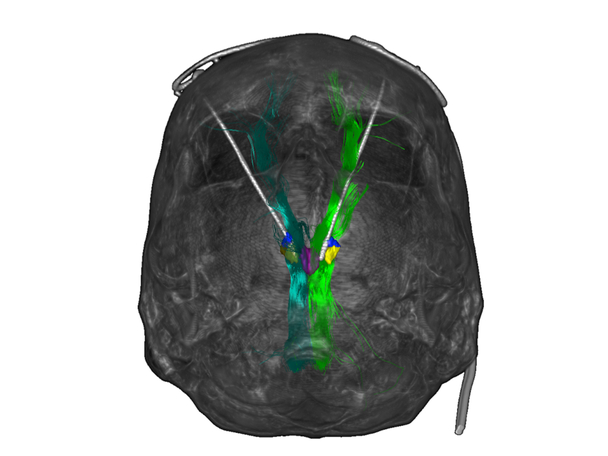
Image: University Medical Center Freiburg
Deep brain stimulation can alleviate or even remedy the symptoms of patients with previously untreatable, most severe forms of depression. This is demonstrated by the researchers at the University Medical Center Freiburg in the first published long-term study on this form of therapy. Seven of the eight patients treated with continuous stimulation had sustained improvements in the symptoms up to four years (the last observation point). The therapy remained equally effective over the entire period. Slight side effects can be avoided by adjusting the stimulation. The study was published on March 1, 2017 in the professional journal Brain Stimulation.
"Most of the patients respond to the therapy. It is unique that they do it continuously. Other forms of therapy often lose their efficacy over time. That is why the Deep Brain Stimulation is a promising approach for people with depression that has not yet been treated», says Prof. Dr. Thomas Schläpfer, Head of the Department of Interventional Biological Psychiatry Unit at the Department of Psychiatry and Psychotherapy at the Medical Center in Freiburg and PI of new BrainLinks-BrainTools project INFER. Deep Brain Stimulation is a method based on mild electrical stimuli that can be used to influence precisely selected areas of the brain.
The eight test subjects had suffered from a severe depression for between three and eleven years with response neither to medication nor to psychotherapeutic treatments or stimulation methods such as electroconvulsive therapy. The doctors implanted ultra-thin electrodes and stimulated a brain area that is involved in the perception of joy and is, therefore, also important for motivation and quality of life. The doctors assessed the effect of the therapy on a monthly basis using the established Montgomery-Asberg Rating Scale (MARDS). Already in the first month the MARDS score of the patients fell on average from 30 points to 12 points and decreased even further by the end of the study. Four patients achieved the MARDS score of less then 10 points, which is the threshold for diagnosis of depression.
Some patients shortly suffered from blurred vision or double vision. "We were able to lift the side effects by reducing the stimulation intensity without diminishing the anti-depressive effect of the therapy", says Prof. Dr. Volker A. Coenen, head of the Stereotactic and Functional Neurosurgery Unit at the Department of Neurosurgery of the University Medical Center Freiburg and PI at BrainLinks-BrainTools as well. No personality changes, mental disorders or other side effects were observed.
In case the efficacy and safety of the therapy is confirmed in a further five-year study with 50 patients, which is currently being carried out at the University Medical Center Freiburg, Prof. Coenen sees the possibility to register the therapy method in Europe. This would allow the therapy use even outside of studies: "Such a deep brain stimulation method could become an effective treatment option for patients with severe depression in a few years", says Prof. Coenen.